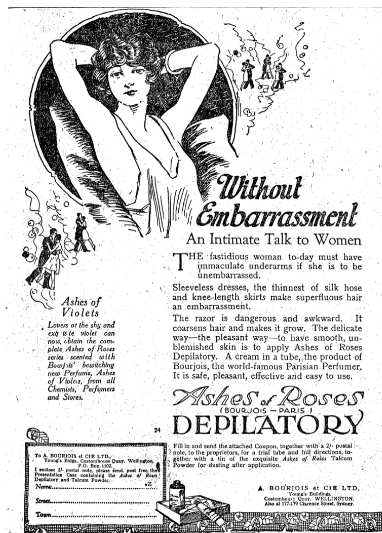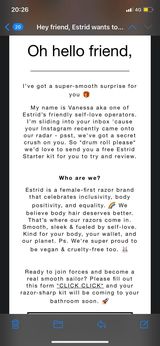‘Hey friend,’ the email read. ‘I’ve got a super-smooth surprise for you.’
It was from Estrid, one of the many ‘revolutionary’ feminine hair removal companies springing up recently. You may yourself have spotted their pastel-pink razors plastered across Instagram or creeping into your DMs.
The offending email was infantilising, playing on Gen-Z terminology to hook in a customer – “we’re like you!” the email screamed. Between liberal rainbow and heart emojis, they denoted themselves as a ‘female-first razor brand that celebrates inclusivity, body positivity, and equality’. They even offered a free razor, all for the low price of an #ad on your personal Instagram account. Now that all sounds good in theory, doesn’t it? But how exactly do they fit into a new era in which empowered personal choice shapes consumerism?

Though body hair removal has been practiced by women for centuries, only more recently has it become a ‘necessity’ through social stigmatisation. The first female-specific razor was introduced to the market in 1915 by Gillette – the Milady Décolleté. Beneath this flowery name lay the new implication that body hair was unsanitary and unsightly, with shame functioning as a vehicle to further this new industry. Thus, the war against female body hair was born.
Feminine razor and hair removal companies have built their empire by creating a problem and inspiring insecurity. Women shouldn’t be hairy, they told us. Women should be smooth, sleek, sexual. This message stuck, for the most part, until very recently when self-empowerment and body positivity movements changed the game. Body hair removal brands now occupy an uncomfortable space, and have quickly changed tack, with new businesses bubbling up to fill the emergent market gap.


Gillette now gleefully crows ‘Say pubic!’ on their social media, openly celebrating hair-down-there, and shares ‘feminist icon’ Ruth Bader-Ginsburg quotes. It’s a far cry from the ‘embarrassment’ of female body hair that they previously shilled. Estrid’s Instragram account is flush with carefully curated, aesthetically pleasing images, and memes likely created by an underpaid intern. They do raise valid points surrounding the necessity of vegan, cruelty-free, and sustainable products (something that in my opinion they should focus more upon). Yet, there is no admission from Gillette, or any other brand in the industry, of their part in creating the body hair stigma that they now “fight” against. In the era of real body positivity movements, it cloys of corporate desperation. More importantly, there is an unspoken unwillingness to take the blame. Should we let the same businesses that shamed and politicised our bodies now encourage us to choose for ourselves? It’s important to remember that as appealing these new brands may be, they’re not your friends. They’re selling you something, be it a product, or an idealised lifestyle (attainable only by using said product).
So, to these companies, my takeaway message is: back off. If we want to seek you out, we will. You don’t get to offer us a choice that was our own to make in the first place.
(But thanks for the free razor.)
Header image credit: Vox

